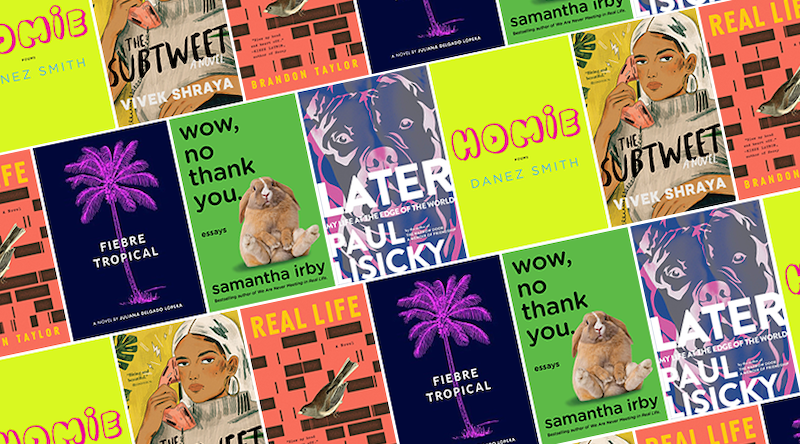
One of the most exciting trends in publishing in the last couple of years is the increase in LGBTQIA+-authored books that are being released—even with marketing budgets! Of course, we have a long way to go in terms of actual publishing parity, but the number and breadth of queer books coming at us in 2020 is thrilling nonetheless. (I had a really hard time narrowing this list to 15 titles; it easily could’ve been twice that.) Here are some of the most anticipated books by LGBTQIA+ writers releasing in the first half of 2020:
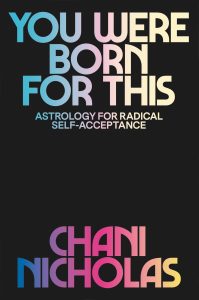
You Were Born For This by Chani Nicholas
(HarperOne, 1/7)
Listen, sometimes astrology can feel inescapable, especially for queer folks. We have a bit of a reputation for becoming obsessed with it. Sometimes, it might feel like if one more person asks you your sign upon first meeting, you’re going to lose it. Sometimes, it can feel like the crystals are coming for you, the tarot cards about to bury you. (For an excellent essay on the power, pleasure, and pain of tarot, I refer to Alexander Chee’s The Querent). But Chani Nicholas might just ease your astrology-anxious mind with her debut book. The internet-famous astrologer, who has a loyal following of over a million readers and horoscopes—and articles in the likes of the New York Times, Buzzfeed, and The Atlantic among dozens of others—is all about keeping it simple. In You Were Born For This: Astrology for Radical Self-Acceptance, Nicholas breaks down what can feel like an overwhelming world of intricacies to guide the reader through their birth chart. With journaling prompts that encourage agency, and an emphasis on astrology as a framing device and not a prophecy, You Were Born For This is refreshingly honest and accessible.
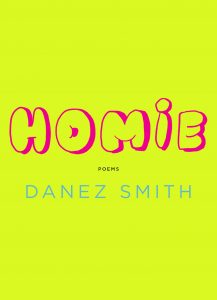
Homie by Danez Smith
(Graywolf, 1/21)
Danez Smith is a powerhouse of poetry. That’s just an objective fact. Their 2018 collection Don’t Call Us Dead was a finalist for the National Book Award and explored themes of queerness, Black love, HIV-positive status, death, life, and America. Their new collection, which has two titles (explained in this great Twitter thread), is loosely about friendship as a powerful form of love and family. Their language is always electric, and Homie is no exception. The ways in which Smith combines syntax, humor, reverence and irreverence are stunning, and this collection of odes is bound to be a widespread poetry favorite of 2019.
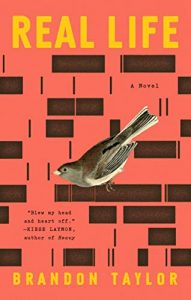
Real Life by Brandon Taylor
(Riverhead, 2/18)
Brandon Taylor, who is a senior editor at Electric Literature and a staff writer at Lit Hub, is finally gifting the world with a debut novel that is so quietly stirring that you won’t know what hit you by the end. Following an introverted PhD candidate named Wallace in close third person, the novel skillfully weaves a story of friendship and superficiality, the subtle and ubiquitous ways in which white supremacy plays out in a white-dominant Midwestern friend group, queer love and queer infatuation. It’s also the best portrayal of an introvert’s inner and outer life in recent memory. With smooth prose and a deeply nuanced protagonist, Real Lifeis one of those timeless stories that also perfectly captures a generational moment.
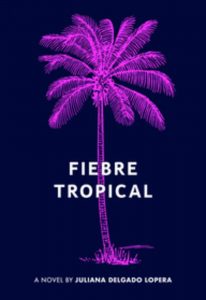
Fiebre Tropical by Juliana Delgado Lopera
(Feminist Press, 3/3)
This glowing novel by Lambda Literary Award-winning Colombian writer and historian Delgado tells the story of 15-year-old Francesca. Moving with her mother from her beloved Bogotá to Miami, to a townhouse full of ants and an evangelical church that claims her mother’s growing devotion, Francesca isn’t exactly psyched about her new life. But at the church, she meets the pastor’s daughter Carmen, falling in love—and trying to love Jesus to grow closer to her. Fiebre Tropical is at turns hilarious and sad, electric and dizzying. A story about coming of age as a queer adolescent, an immigrant, a daughter, a bilingual kid, a complex human being, this book is fast-paced and energetic while also being heartfelt and captivating.
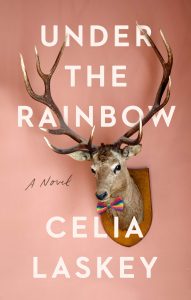
Under the Rainbow by Celia Laskey
(Riverhead, 3/3)
This novel from Celia Laskey is one of the most surprising debuts of the year. From the outside, its structure seems tricky—eleven narrators, each with their own chapter (only one gets two), and a small town vs. outsider premise. But Laskey has chops, because this book works on pretty much every level. When the small town of Big Burr, KS is named “the most homophobic town in the U.S.” by a national nonprofit, said nonprofit sends a “task force” of queer folks to live there for two years. You know, change hearts and minds. The resulting madcap—but also deeply resonant, complex, and heartfelt—story (or rather, stories) is as compelling and engrossing as you could want a novel to be. The broad array of perspectives adds nuance rather than detracting from it; the different voices all feel imperative to the overall arc. This book reminds me a little of a novelized version of one of my favorite books of 2019, Samantha Allen’s Real Queer America, and will resonate with any reader who wants a really meaty, funny, and fast-paced novel. Also, it’s dedicated “to my queers,” which is just the first smile this book will draw from you.
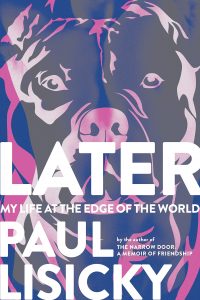
Later by Paul Lisicky
(Graywolf, 3/17)
Paul Lisicky is the celebrated author of five previous books, including two novels and two other memoirs. In Later, Lisicky chronicles his time living in Provincetown in the early 1990s, a queer artists’ mecca and haven. But in the midst of the AIDS crisis, when so much of the community was dying, Provincetown changed just as all of the queer landscape changed. Delving into the dichotomy of utopia and dystopia; into bodies, love, community, and queer life; Lisicky brings his signature attentive and sumptuous prose to yet another tender, vital work of literature.
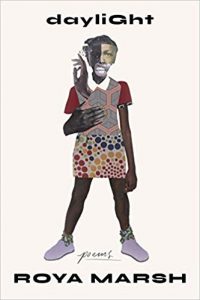
dayliGht by Roya Marsh
(MCD x FSG, 3/31)
Poet, performer, and activist Roya Marsh’s debut collection is one of the most exciting to be released by a major publisher this year. It encompasses her own experiences growing up a butch, queer Black woman in America; it brings to life the complexities of coming of age in a heteronormative, white supremacist, gender-policing society. It is potent and sharp, abundant and grand. This one will grab you, and it will stay in your body long after you’re done reading.
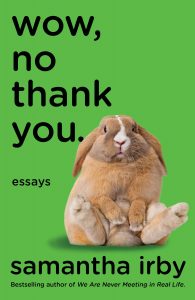
Wow, No Thank You by Samantha Irby
(Vintage, 4/7)
Another entry into the “best dedications” category (this one’s dedicated to Wellbutrin), Samantha Irby’s third essay collection shows that, like the most expensive cheese, she only gets better with time (I feel like she’d appreciate this metaphor, but she’d also come up with one ten times wittyer). If for some reason (that I can’t fathom) you’re unfamiliar with Irby, she is the author of Meaty (2013, with a reprint in 2018) and We Are Never Meeting in Real Life (2017), and she wrote the pool party episode of Hulu’s TV adaptation of Lindy West’s 2015 memoir-in-essays, Shrill. Irby is, in a word that’s not a word, smartfunny. Wow, No Thank Youis written in a similar style to her previous collections, full of detail from a messy life; she proves that notion often taught in writing classes that the more specific writing is, the more universal. This collection’s essays range from the discomforts of the body, the absurdity and frustration of trying to work in Hollywood (and of the industry itself), the 90s, moving with her wife from Chicago to a small town, bougie culture, and yes, animals (Irby worked in an animal hospital for 14 years, and also almost got a dog). The essays here vibrate with humor and relatability (sorry for using that word), and will be embraced with open arms by the many fans of her work (and hopefully by those who haven’t discovered her yet, if there are such people).
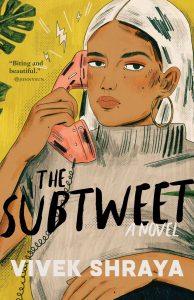
The Subtweet by Vivek Shraya
(ECW Press, 4/7)
Vivek Shraya is an icon of multidisciplinary art. A musician, visual artist, writer, filmmaker, actor, and all-around magnetic human being, Shraya pushes against, subverts, and shatters the constraints of capitalism, white supremacy, misogyny—which are really all the same thing. Their second novel centers on Neela, a songwriter, and famous singer Rukmini—or RUK-MINI, as she’s known. When RUK-MINI covers one of Neela’s songs and it goes viral, they form the kind of fast, deep, entangling friendship that women often can. But that friendship is not immune to the pressures of social media, jealousy, and, well, the white supremacist cis-hetero patriarchy. With signature humor and heart, Shraya delivers another radiant book—complete with its own soundtrack, because this is Vivek Shraya we’re talking about.
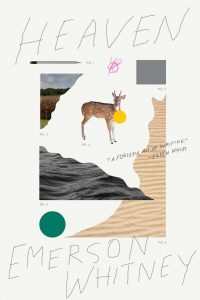
Heaven by Emerson Whitney
(McSweeney’s, 4/14)
This gorgeous, short memoir, written by poet and Goddard College teacher Emerson Whitney, has been compared to Maggie Nelson’s The Argonauts, and with good reason. Its genre-bending structure and lyrical, intellectual, sensuous lines remind of that other pillar of proof that poets write some of the best memoir (and fiction). But genre categorization defies the heart of the book, as does any comparison to other writers—Heaven stands alone, and like any brainy-but-feely work that engages with queer theory, it questions everything. This includes what a self even is and what, how, and who shapes our views of the world and of self as we grow up. Melodic and engagingly written, Heaven will enrapture anyone who loves reading for beauty and intellectual challenge at once.
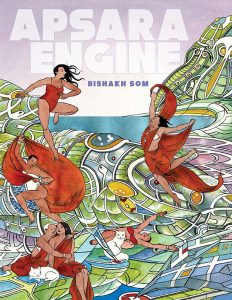
Apsara Engine by Bishakh Som
(Feminist Press, 4/14)
This is the only graphic novel on this list—well, it’s really a graphic short story collection—and further evidence of the multidisciplinary richness of so many literary queer artists. Aspara Engine—the first work of fiction by artist, illustrator, and architect Som—is magnificently illustrated and replete with gender- and sexuality-diverse characters. Traversing the known and unknown, Aspara Engine’s settings are as rich as its characters, its storylines as unsettling as they are deeply compelling and beautiful. Tackling themes of past and present, love and longing, urbanity and mythology, this is a vibrant debut.
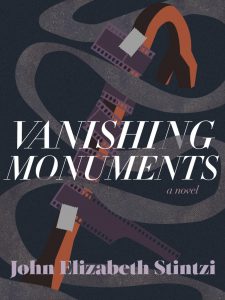
Vanishing Monuments by John Elizabeth Stintzi
(Arsenal Pulp Press, 5/5)
John Elizabeth Stintzi has not one but two books releasing in 2020—their poetry collection Junebat comes out April 7 from House of Anansi. So this is really two recommendations in one, because Stintzi—whose work has appeared all over the place from Ploughshares to The Kenyon Review—is on the rise. Their debut novel centers on nonbinary teacher and photographer Alani Baum, who hasn’t seen their mother in almost 30 years, since they ran away from home at age 17. When they get the message that their mother is in an assisted living facility with ever-worsening dementia, they return to their now-empty childhood home, reckoning with grief (and love) for the past, the present, and the future. A handful of recent memoirs have explored what it means to be a queer person with an aging parent—Cherríe Moraga’s Native Country of the Heart and Elissa Altman’s Motherland come to mind—but precious little fiction, let alone with a nonbinary protagonist, roams this territory. Vanishing Monuments is a luminously written novel from an exciting writer, a welcome story of a midlife queer that many of us crave.
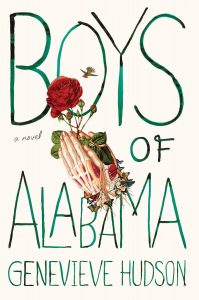
Boys of Alabama by Genevieve Hudson
(W. W. Norton, 5/12)
Genevieve Hudson’s previous books—the short story collection Pretend We Live Here (Future Tense Books, 2018) and the essay-in-book-form A Little In Love With Everyone (Fiction Advocate, 2018), as well as her numerous stories in lit mags from McSweeney’s to Joyland to No Tokens—have established her as a literary favorite among those who follow her work. In this debut novel, Hudson draws on her skill as an extra-imaginative storyteller, using magical realism, shimmering imagery, and brilliant character development to tell the story of a queer German teenager in Alabama; his goth, witchy love interest; football and religion; life and death; longing and choice. Boys of Alabama is best read without knowing too much about the plot—go forth, dear reader, and be dazzled.
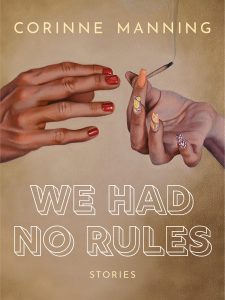
We Had No Rules by Corinne Manning
(Arsenal Pulp Press, 5/12)
This debut short story collection from Seattle-based writer, artist, and teacher Corinne Manning is exactly the kind of book the queer canon needs. It’s so readable that, at less than 200 pages, it can be finished in one sitting—but it will linger far past that concentrated period of time. The stories effortlessly blend humor, emotion, effervescent prose, and a broader reckoning with capitalism, queer assimilation, and autonomy. As necessary as it is delightful, We Had No Rules is not to be missed.

Fairest by Meredith Talusan
(Viking, 5/28)
In this stunning debut memoir from writer and contributing editor for them., Meredith Talusan sculpts a comprehensive and nuanced story of their coming of age as a Filipinx child with albinism, an immigrant to the U.S., a queer and trans person who refuses to accept simple, prescriptive, or otherwise limiting notions of any of these identity markers. Talusan’s verdant prose and ability to relentlessly question, push, and redefine the arbitrary lines of gender, sexuality, identity, disability, and institutions, combine to make a story that is as engrossing as it is necessary. It’s a gorgeous book full of love, family, neglect, race, power, and what it means to live a life.

